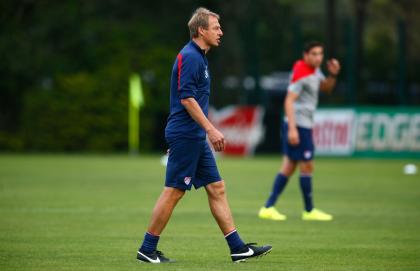The X-factor for U.S. penalty shootout success
For complete World Cup 2014 coverage visit Yahoo Sports and follow @YahooSoccer
SAO PAULO – The heart-stopping start to the World Cup's round of 16, where host nation Brazil rode its luck and crept forward in the tournament by the width of a post, should have brought things into sharp focus for the United States.
This is knockout soccer. This is all or nothing. And this is where 120 minutes of toil can end in the harshest, most naked form of soccer entertainment – the penalty shootout.
As a way of deciding a game and the collective mood of a country, penalties are surreally addictive drama. For the players, there is no place to hide, and the intensity of victory and defeat is boiled down into a few precious moments.
Some nations are haunted and terrorized by them, like England, which has gone 0-for-3. Others have found unbridled joy.

The U.S. has no real history in shootouts, at least not at the ultimate level of a World Cup. That might not be a bad thing. Especially when it has the expertise of the greatest penalty-taking nation on earth in its corner.
Going into Tuesday's round-of-16 clash with Belgium at Arena Fonte Nova in Salvador, head coach Jurgen Klinsmann has been going over a lot of things. One topic has been penalties.
"You prepare for penalties," said Klinsmann, who was involved in winning shootouts as a player for West Germany in 1990 and as head coach of Germany in 2006.
[Related: U.S. plans to stay in World Cup]
"You tell the players how to approach a penalty. It's a mental moment, so if you are not prepared for that mental moment to walk from the halfway line in front of 60,000 people to the penalty spot and get the job done, then I think it is wrong."
Germany's record in shootouts isn't just good. It is ridiculous.
The Germans won the first shootout in World Cup history, against France in the 1982 semifinals. It beat Mexico 4-1 from the spot in the 1986 quarterfinals. It set off a generation of nightmares for England by being clinically perfect in the 1990 semifinals. And it cut off Argentina while hosting the tournament in the 2006 quarters.
During that run German players have converted 17 out of 18 times, including a current run of 15 straight. And, in case you haven't been following too closely, the U.S. has a distinctly Germanic flavor running through it.
There is Klinsmann, obviously, and his special advisor Berti Vogts, who was coach of Germany in 1996 when it won the European Championship. Also on Klinsmann's staff is Matthias Hamann, chief scout for the U.S. program and former German Bundesliga player, and Andreas Herzog, assistant to Klinsmann and an Austrian who spent most of his career in Germany.
On the roster are five German-Americans: Jermaine Jones, Fabian Johnson, John Brooks, Julian Green and Timmy Chandler, although Brooks, Green and Chandler have been unable to crack the starting lineup in this tournament.
[Slideshow: Candid moments inside the World Cup tunnel]
Penalties are about a pivotal combination of a clear mind and precise technique. Some coaches don't believe in practicing them, believing you can never replicate the pressure of the moment on a quiet training field.
Germany has always guarded its secret to near-perfection closely. The U.S. players are surely getting a taste of it this week.
Belgium has had just one shootout in its history, beating Spain in 1986 to advance to the last four. Eden Hazard is a fine penalty-kick exponent, having taken one for Chelsea in last season's Champions League and converted Belgium's only spot kick during qualifying.
For the Americans, selecting the five men to step up first would be somewhat tricky. Clint Dempsey would be an obvious choice, as he is the assigned penalty taker during regulation. However, he did miss against Mexico in qualifying and did not have a perfect record during his time in the English Premier League.
Klinsmann may look to the central core of his midfield, with Michael Bradley, Jermaine Jones and Kyle Beckerman all perceived as the kind of clutch performers to deliver when called upon. Beckerman took a penalty and scored for Real Salt Lake in last season's MLS Cup final. Graham Zusi and Matt Besler both missed in that game, although their Sporting Kansas City team won the shootout and the title.
Fabian Johnson's ball-striking technique could put him in the mix, while DaMarcus Beasley has a ton of experience and could be selected for that reason.
Then there is the question of who would be on the field, and still with sap in their legs, after 120 minutes. Substitutes are often used in shootouts for their comparative freshness. Jozy Altidore would be a lock if he was fit and on the field; Chris Wondolowski and Aron Johannsson would also merit strong consideration.
Brad Davis is a fine striker of a soccer ball and scored the winning kick in the penalty shootout of the 2005 Gold Cup final against Panama.
Right now, only Klinsmann and his camp know the plan – a plan for a scenario no player truly wishes but one that provides any World Cup with its most intense form of exhilaration.
More World Cup coverage on Yahoo Sports:



